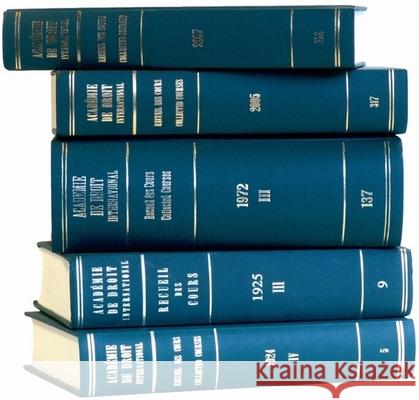Recueil Des Cours, Collected Courses, Tome 425 » książka
Recueil Des Cours, Collected Courses, Tome 425
ISBN-13: 9789004517707 / Francuski / Twarda / 2022
Brusil Miranda METOU, Le contrôle international des dérogations aux droits de l'homme and Eduardo SILVA ROMERO, Legal Fictions in the Language of International Arbitration.
Résumé: Le contrôle international des dérogations aux droits de l’homme:
La protection des droits de l’homme est une exigence de la société internationale contemporaine, et sa dérogation, une nécessité de survie de l’État, face à un danger public exceptionnel. Le contrôle international est la limite incontournable, pour éviter les abus. Il se décline en un ensemble de mesures, normatives et institutionnelles, prévues par les conventions internationales de protection des droits de l’homme. D’emblée, certains droits en raison de leur fondamentalité, sont indérogeables et la dérogation en elle-même est entourée de conditions strictes. Le contrôle est opéré par les organes internationaux, qui veillent à la proportionnalité et la régularité des mesures de dérogation. Ce contrôle vise également le respect par les Etats de leurs obligations internationales en matière des droits de l'homme. A l’issue, soit les mesures prises par l’État sont considérées comme justifiées, soit sa responsabilité est engagée. Malgré ses insuffisances, le contrôle est sans conteste, le défi permanent de l’effectivité de la protection internationale des droits de l’homme.
Summary of the Course “Legal Fictions in the Language of International Arbitration” by Eduardo Silva Romero:
The language of international arbitration is rarely analyzed through the prism of the notion of “legal fiction”. Legal fictions, however, are very often used and relied upon in the language of international arbitration. As a result, the goal of this Course is to shed new light on international arbitration by exploring it through the notion of legal fiction. Its main conclusions are these:
First, legal fictions are used and relied upon in the language of international arbitration to bolster it in its longstanding fight for survival. Arbitration, after all, has been and still is a fragile institution. In other words, legal fictions in the language of international arbitration have become efficient tools to counter the attacks sometimes directed against the institution of arbitration from both the outside (such as by public authorities) and from within (such as by the so-called “users” of arbitration). The legal fictions of “autonomy of the international arbitration agreement” and the “principle of Kompetenz-Kompetenz” are good illustrations of this phenomenon.
Second, some legal fictions are aimed at providing international arbitration with a necessary foundational theory. A foundational theory underlying international arbitration is necessary to ensure and enhance its legitimacy as a means for resolving international disputes. The theories of the “arbitral legal order”, the “fundamental right to arbitrate,” and the “assimilation of arbitrators and judges,” together with their logical corollaries, are very interesting examples of this category of legal fictions in the language of international arbitration.
Third, other legal fictions are specific legal rules aimed at ensuring the existence, autonomy, and validity of international arbitration. French arbitration law encompasses several legal fictions of this kind. The “autonomy of the international arbitration agreement,” the “principle of Kompetenz-Kompetenz,” the “principle of validity of the international arbitration agreement,” and the theory of the “extension of the international arbitration agreement to non-signatories” are important manifestations of this kind of legal fiction.
Lastly, the legal fiction as an intellectual tool is from time to time abused in the language of international arbitration. Some misunderstandings surrounding the “autonomy of the arbitration agreement” as well as some interpretations of investment treaties by investment arbitral tribunals demonstrate this point well.
Be all that as it may, the notion of legal fiction as used and relied upon in the language of international arbitration allows us to better understand, from a theoretical perspective, the nature of the Rule of Law.











